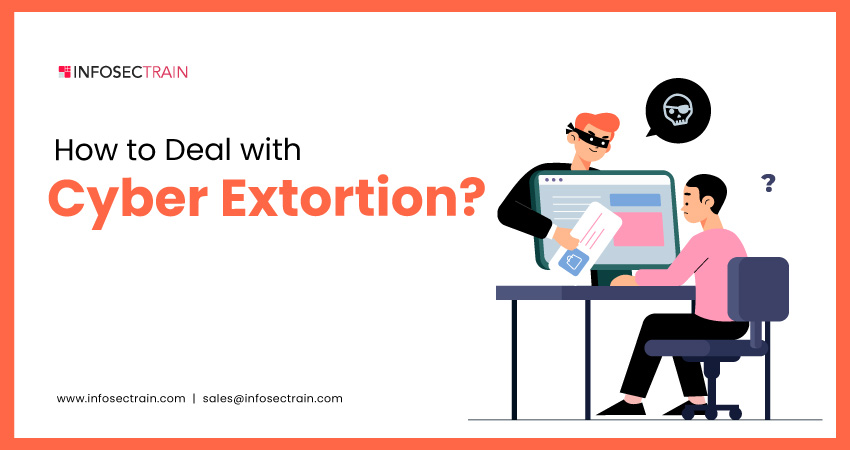How to Deal with Cyber Extortion?
Back in the day, blackmailers would threaten to disclose embarrassing or damaging information about a target if they did not comply with their demands. Now they use technology for such purposes, and it has become a common tactic that malicious people use to extort money or favors from others in the modern digital world. You might have come across the term cyber extortion. Cyber extortion can be a devastating experience for individuals and organizations, as it can result in the loss of sensitive data and disrupt essential business operations. Moreover, they often involve a high level of anonymity and lack physical contact. Therefore, it can be difficult for victims to know how to handle cyber extortion threats. In this article, we will discuss several measures you can take to safeguard yourself and your organization from cyber extortion attacks, as well as what to do if you end up a victim.

Table of Contents
What is cyber extortion?
How does cyber extortion differ from blackmailing?
How does cyber extortion work?
How do you respond to cyber extortion?
Why is cyber extortion increasing?
What are the various ways to prevent cyber extortion?
What is cyber extortion?
Cyber extortion is the type of cybercrime where an attacker uses digital threats or coercion to force someone to do something against their will. This can include demanding money or sensitive information, threatening to release sensitive information, or threatening to disrupt business operations through cyber attacks.
In other words, cyber extortion is a type of online crime in which a hacker or group of hackers demands some form of ransom from a victim in exchange for not launching a cyber attack against the victim or not releasing sensitive information that has been obtained through unauthorized access to the victim’s computer or network.
An example of cyber extortion might involve a hacker breaking into a company’s computer systems and stealing sensitive data, such as customer information or financial records. The hacker might then threaten to release this data publicly or sell it to competitors unless the company agrees to pay a ransom. The company might be given a deadline to pay the ransom and warned that the consequences would be dire if they fail to comply. Another example of cyber extortion might involve a hacker using malware to lock a victim’s computer or mobile device and demanding payment to restore access.
How does cyber extortion differ from blackmailing?
Both cyber extortion and blackmail involve the use of threats and intimidation to coerce someone into doing something against their will. In both cases, the victim is put in a vulnerable position and may feel they have no choice but to comply with the demands to protect themselves or their reputation.
However, there are some differences between cyber extortion and blackmail. Cyber extortion is typically carried out using technology, such as through the use of malware or ransomware. At the same time, blackmail is often done through more traditional means, such as letters or in-person threats. Additionally, cyber extortion is often a more impersonal crime, as the perpetrator may not even know their victim, while blackmail usually involves a personal relationship between the victim and the blackmailer.
Cyber extortion can be viewed as a contemporary variation of blackmail, where individuals are compelled to act against their will through the manipulation of threats and intimidation. However, it is often carried out using technology and may be more impersonal than traditional forms of blackmail.
How does cyber extortion work?
Cyber extortion is a type of crime that involves threatening to release or publish sensitive information or to disrupt a service unless a ransom is paid. The perpetrators of cyber extortion may use a variety of tactics to carry out their attacks, including malware, phishing, and social engineering.
One common form of cyber extortion is known as “ransomware,” in which the attacker infects a victim’s computer with malicious software that encrypts the victim’s data and demands a ransom for the decryption key. The victim is generally given a deadline to pay the ransom, and if it is not paid, the attacker may threaten to release or delete the victim’s data.
Another form of cyber extortion involves threatening to release sensitive information, such as personal or financial data, unless a ransom is paid. The perpetrators of this type of attack may have obtained the sensitive information through a data breach or by using social engineering techniques to trick the victim into revealing it.
In some cases of cyber extortion, the threat could involve the release of compromising or confidential information, leading to dire consequences for the victim if not resolved. This scenario creates a harrowing dilemma for individuals or organizations facing such coercion, as failure to comply may result in significant reputational damage or financial losses.
How do you respond to cyber extortion?
Cyber extortion is a severe threat that can have significant consequences for individuals and organizations. If you become the victim of a cyber extortion attack, it is essential not to pay the ransom and report the attack to the appropriate authorities.
The following are some ways you can take to deal with cyber extortion:
- Do not panic: It is important to remain calm and not make any rash decisions.
- Don’t pay ransom: Paying the ransom only encourages the cyber extortionist to continue their behavior and may not guarantee the release of your data.
- Document the incident: Make sure to record all communication and any evidence related to the extortion attempt, like any communication with the extortionist, including the threat, demands, and payment requests. This information will be helpful in the event that you need to report the incident to law enforcement or seek legal assistance.
- Contact law enforcement: Cyber extortion is a crime, and it is important to report it to the authorities. So, report the extortion to the authorities. They can help you determine the best course of action and may be able to track down the extortionist.
- Seek legal advice: A lawyer can help advise you on your options and assist you in navigating any legal issues related to the extortion attempt.
- Consult with cybersecurity experts: Seek the advice of cybersecurity professionals who can help you assess the condition and determine the best course of action.
- Create a backup plan: Make sure you have a backup plan in case your data is compromised. This includes regularly backing up your data and having a disaster recovery plan in place.
- Enhance your cybersecurity: Make sure to take measures to strengthen your cybersecurity posture, such as implementing strong passwords, regularly updating software and applications, enabling two-factor authentication, and educating employees on cyber threats. This will make it more difficult for hackers to obtain access to your systems in the future.
Why is cyber extortion increasing?
Recently we can observe there has been a significant increase in cyber extortion in recent years. One of the primary reasons for the rise in cyber extortion is the growing use of the internet and the proliferation of personal and business data online. Cybercriminals can easily access and target this data to threaten and extort individuals and companies.
Another factor contributing to the increase in cyber extortion is the effectiveness of this type of crime. Cybercriminals often use ransomware to encrypt data or disrupt website operations, which makes it difficult for victims to recover their information or operations without paying the ransom.
Detecting network intrusions and suspicious behavior has also become a crucial aspect in understanding why cyber extortion is on the rise. With the advancement of technology, cybercriminals have developed sophisticated methods to infiltrate networks and systems, making it challenging for individuals and organizations to detect and prevent extortion attempts before they cause significant damage.
What are the various ways to prevent cyber extortion?
Individuals and businesses need to implement robust cybersecurity measures and have a plan to handle potential extortion attempts to combat this increasing threat. One of the most vital things to do is to stay informed about the newest threats and best practices for cybersecurity. Here are several other ways individuals and organizations can use to prevent cyber extortion:
- Always use strong and unique passwords for all your accounts, and regularly update them.
- Enable two-factor authentication on every account you own.
- Keep your software and devices updated with the latest security patches.
- Use reputable antivirus and firewall software to protect your devices.
- Never click on links or download attachments from sources you do not recognize.
- Be cautious when disclosing personal information online, and avoid posting sensitive information on social media.
- Use a VPN to protect your data and privacy when connecting to the internet.
- Regularly back up your data to protect against data loss.
- Educate yourself and your employees about cyber security best practices and the risks of cyber extortion.
- Consider purchasing cyber insurance to safeguard your organization against cyber extortion and other cyber threats.
Additionally, report cyber extortion promptly to relevant authorities and law enforcement agencies. Reporting such incidents not only helps in apprehending the perpetrators but also contributes to the collective effort in combating cybercrime and protecting potential future victims.
How can InfosecTrain help?
Cyber extortion can have severe consequences for individuals and businesses, including financial losses, reputational damage, and legal issues. It is essential to take steps to protect yourself and your organization from cyber extortion, such as by regularly updating your software and using strong, unique passwords and by being cautious when checking emails or clicking on links from unknown sources.
Online safety is paramount in modern digital era, and maintaining vigilance against cyber threats is crucial for safeguarding sensitive information and preserving your peace of mind. By staying informed about cybersecurity best practices and implementing robust security measures, you can reduce the risk of falling victim to cyber extortion and other malicious activities.
Enroll in one of InfosecTrain’s many cybersecurity training courses to learn more about cyber extortion and how to protect against such threats. These courses are curated to provide you with the knowledge and skills required to stay ahead of cybercriminals and malicious hackers in this fast-evolving digital threat landscape. If you are completely new to the world of cybersecurity, we recommend you enroll in our “Cyber Security Orientation Program (Foundation Level)” which is designed for absolute beginners in the field.







 1800-843-7890 (India)
1800-843-7890 (India)